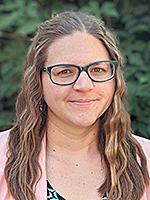Claire V. Madill
2023 Temple Bar Scholar
 The Temple Bar Scholarship was an incredibly worthwhile experience. Without it, I would have never realized the extent of the divide between the American and British legal systems.
The Temple Bar Scholarship was an incredibly worthwhile experience. Without it, I would have never realized the extent of the divide between the American and British legal systems.
The first week was a whirlwind and, honestly, a bit of a culture shock. Some days lasted more than sixteen hours, but I can tell you it was well worth it. We met the most important people in the UK legal system, including the brand-new Lady Chief Justice on the second day of her new gig and multiple UK Supreme Court Justices. It was during this week that we learned about the split in the UK legal profession between barristers (who do all of the in-court arguing and appearances) and solicitors (who do all of the client contact/investigating/basically everything before the case actually goes to court). We also learned about the nuances of legal degrees, including the requirement that every potential barrister join an “Inn” and that they must have a “pupillage” (roughly, a training period). It was also fascinating to see how interested in American law the barristers were and, in particular, how disparaging they generally were toward the idea of “originalism” as a mode of constitutional interpretation—ironic given that American originalism tends to look to old UK law for inspiration.
During the second and third week, we were placed with Chambers, which are like law firms for barristers. For me, the highlight of these weeks was an opportunity to watch a criminal trial with a barrister from Church Court Chambers. The differences between American and English criminal trials are shocking. For example, the defendant cannot sit next to his barrister, but rather is stuck far away in a “dock” that resembles a jail cell in some respects. And the lack of a constitutional right to confrontation was stark: the complaining witness never showed up to the trial (rather, the parties played the complainant’s police interview and a prerecorded cross-examination); witnesses could testify with a screen blocking the defendant’s view of them; and the parties agreed to read witness statements verbatim into the record so that the witnesses did not have to appear at trial. Other differences included the fact that the prosecuting barrister and investigating law enforcement officer read out the defendant’s statement, with the prosecuting imitating the defendant and the fact that, at the end of trial, the judge gave not just legal instructions, but also her own summary of the evidence. Congrats to Sir Johnson for the “not guilty” verdict.
Our final week was spent at the United Kingdom Supreme Court. Perhaps its due to its age (the Supreme Court was established less than two decades ago), but I was really struck at how laid back everything was. It was very different from the pomp and circumstance sometimes seen at the Inns or various barrister Chambers or even the United States Supreme Court. It was also interesting to see how much emphasis the Court places on oral advocacy over written advocacy, as the opposite seems true in the United States. Many thanks to Lord Briggs and his Judicial Assistant, Lydia, for hosting me.
The icing on the cake was how wonderful the American Pegasus Scholars and my co-Temple Bar Scholars were. We had a really great group that seemed to enjoy spending time with one another and learning together. I look forward to seeing them at future American Inns of Court events. And speaking of the American Inns of Court, I owe a huge debt of gratitude to everyone involved in making this program possibly, especially the indomitable Cindy Dennis.